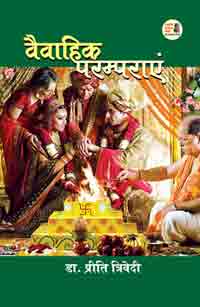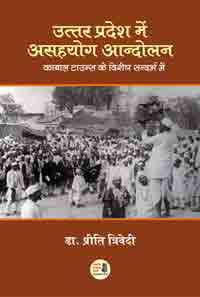|
इतिहास और राजनीति >> आर्किटेक्ट ऑफ ए फिलॉसफी आर्किटेक्ट ऑफ ए फिलॉसफीडॉ. प्रीति त्रिवेदी
|
|
||||||||
पं. दीनदयाल उपाध्याय जी के एकात्म मानववाद का अंग्रेजी भाषा में निरूपण
Deendayal Upadhyaya was the rare combination of an activist, a thinker philosopher and an ideologue. The concept of 'Integral Humanism' propounded by Deendayal Upadhyaya embodies the essence of human unity and development. The entire political history of Post Independence period needs to be properly recorded. Whenever such a history is written it would further raise the contribution of Deendayal Upadhyaya.
What makes us proud as an Indian is Pt Deendayal's philosophy of Ekatma Manavwad or integral humanism and the same is evident in his political, social and cultural ideology. As a political ideologue he had firm belief in the slogan of Janasangh-
Ek Desh Me Do Vidhan - Nahi Chalega
Ek Desh Me Do Pradhan - Nahi Chalega
Ek Desh Me Do Nishan - Nahi Chalega
He advocated unitary form of government which envisages one centre but he always favoured decentralisation to the lowest unit of administration. His idea of infinite spiral unitary State put centre at the top and province, Janapad, Block, Village and Panchayat below it. Similarly distribution of financial powers should be such that the lowest tier of administration, viz. village Panchayat must have some autonomy.
Architect of A Philosophy : Deendayal Upadhyay
Index
1. Introduction :
The Birth Of Rashtriya Swayamsevak Sangh 11
Impact Of The West 12
Birth Of Indian Renaissance 14
Background And Birth Of R.S.S. 19
Birth And Background Of R.S.S. 20
The Founder 20
Feiry Advocacy Of Case For Freedom 21
Discovering The Historical Truth Of Hindu Rashtra 21
Enemies Efforts To Destroy Hindu Spirit 23
Shattering Experiences Of Growing Muslim Communalism 23
Why Was The Sangh Established 24
Objectives Of R.S.S. 25
Progress Of Rashtriya Swayamsevak Sangh Up-To 1939 26
Capturing Patriotic Heart 26
Participation Of R S S In Nationalist Activities 27
Government Humbled 28
Efforts For National Flag 28
Footnotes 29
2. Early Life And Education Of Pt. Deendayal Upadhyaya 31
Early Life 31
Joint Family 32
Series Of Tragedies 32
Formal And Informal Education 33
Footnotes 38
3. Initation In Rashtriya Swayamsevak Sangh (1937-50) 39
Pracharak Of The Sangh : His Vision 40
First Historical Book : Samrat Chandragupta 42
Adya Shankeracharya - His Dharma Renaissance. 42
Impact Of Dr. Hedgewar 44
Role Of R.S.S. During Quit India Movement 45
Disturbances Following Gandhiji's Assassination 46
Publication Of Rashtra Dharma 48
Footnotes 49
4. Services To The Janasangh 50
Birth Of Janasangh 50
Conflicts In The Congress 51
Invitation To Sangh 52
The Trial Of Strength In Congress 54
Resignation Of Tandon And Death Of Sardar 55
Open Debate In Sangh 56
Non-Political Party 57
Golworker, Mukherjee And Janasangh 58
Next Step Of Janasangh 59
Establishment Of Janasangh 60
Deendayal Upadhyaya As The General Secretary Of Janasangh 61
His Work As A General Secretary Of Janasangh 62
General Secretary Report 64
Jaunpur By-Election 78
Foreign Journey 80
Coalition Government And Deendayal Upadhyaya 82
The Prisedent Of Janasangh 83
A. Conduct Of Governors 84
B. Coalition Government 84
C. Parliamentary Democracy 84
D. Floor Crossing 84
E. Centre State Relation 84
F. Permanent Finance Commission 85
G. Kashmir Problem 85
H. The Question Of Language 85
Footnotes 86
5. Abrupt And Tragic End 90
Last Journey 1 90
Mystery That Remains 92
Judgement 92
Evaluation 99
Footnotes 101
6. Political Activism And Thoughts 102
Part - A
Political Activism 102
1. Akhand Bharat (Undivided India) 102
2. Kashmir Movement : 104
3. Goa Liberation Movement 108
4. Mass Movement Against Transfer Of Berubari 110
5.A Grand Demonstration Against Kutch Agreement 112
6. Indo-Pak War (1965) And Tashkent Declaration 114
7. Nationalistic Foreign Policy 116
8. Defence Policy : 121
9. Re-Organisation Of States : 123
10. Language Policy : 127
11. Medium Of Education : 133
12. Local Self Government : 135
Part - B
Political Thoughts : 137
1. Evolution Of State 137
2. Nation And Nationalism : 140
3. Rajyavaad : 146
4. Dharma Rajya : 147
5. Democracy : 150
(I) Birth Of Democracy In Europe : 151
(Ii) Indiannisation Of Democracy : 152
1. Tolerance And Restraint : 154
2. Unattachment : 154
3. Respect For Law : 155
1. Kings : 158
2. Casteism : 158
3. Industrialist : 158
(B) Good Voter : 159
(3) Democracy Is Necessary For National Integration : 160
(4) Opportunist Politics Of Joint Front : 160
(5) Code Of Conduct For Parties : 161
(6) Socialism : 162
(7) Welfare State : 164
A. Bit About Our Constitution: 165
A. Federal Government : 165
B. Unitary Constitution 167
Footnotes 172
Part - I 172
Part - B 175
7. Social Activism And Thoughts 178
Part-A 178
Social Activism : 178
1.Akhil Bhartiya Viddyarthi Parishad (Abvp) 179
2. Vishwa Hindu Parishad : 179
3. Bhartiya Majdoor Sangh : 180
4. Journalism : 181
5. Women's Wing (Mahila Agadhe)16 182
6. Social Reforms : 183
Part - B 184
Social Thoughts : 184
1. Varna Vyavastha (The Class System) : 185
2. Change-Oriented : 187
3. Education : 188
A. Mother Is The First Teacher : 191
B. School Teacher : 191
C. Person Himself : 192
4. The Muslim Problem : 193
5. Hindu-Muslim Unity : 196
Part- C 197
Philosophical Thoughts 197
How To Achieve :
1. Vyakti (Individual) 200
2. Samashti (Society): 202
3. Shrashti To Parameshthi (Creation To God): 203
4. Sanskriti : 207
5. Chiti 208
6. Virat : 211
7. Purusharthas : 213
Dharma : 214
Artha : 214
Kama : 215
Moksha (Salvation) : 215
8. Dharma : 217
Integral Humanism 220
1. Historical Background : 220
2. Ideological Background : 224
A. Western Philosophy Of Life : 224
B. Indian Culture : 229
3. Development Process And Name 232
4. Darshan 234
Analysis Of Integral Humanism. 234
(A) Individual And Society : 238
(A.2) Action 238
(A.3) Social Security 238
Inferences 238
(A.4) Social Action (Yagya 238
Inferences 239
(B) Realizing The Four Pronged Action (Chaturpurusharthas) 239
(B.1) Dharma 239
(B.2) Artha 239
(B.3) Kama 239
(B.4) Moksha 240
(C) Comprehensive Thinking (Virat Darshan) : 240
5. Social Tendencies : 241
Evaluation : 245
Relevance In Twenty First Century — 248
Footnotes 249
8. Economic Thoughts And Observations 255
Artha In Indian Culture 256
The Question Of Ownership 256
Capitalism 258
Socialism 260
Foreign Capital 261
Economic Democracy 264
Direction Of Industrialisation 266
Surplus Production Or Aprimatrik Udyogniti 268
Decentralization 269
Man And The Machine 272
The Seven M's 49 273
Diginity Of Labour In The Economy 273
Arth-Sanskriti 275
Ideal Economy 277
Part - B 279
Economic Observations 279
Public Law 480 (P.L.480) 279
Goi's Gold Policy 70 282
The Devaluation Of The Currency 284
Co-Operative Farming 286
Five Year Planning 288
Footnotes 290
9. Conclusion 295
Foot Notes 306
Appendix 308
A. Conduct Of Governors : 308
B. Coalition Governments : 308
C. Parliamentary Democracy On Trial : 309
D. Floor-Crossing : 309
E. Centre-State Relations : 310
F. Permanent Finance Commission : 310
G. Diversionary Tactics : 311
H. Kashmir Problem : 311
I. The Question Of Language : 311
Bibliography 313
1. Reports And Articles : 313
2. Letters : 314
3. Registers : 314
4. Periodicals, Journals And News Papers : 314
5. Books : 314
6. Some Other Books : 319
Interviews : 319
|
|||||


 i
i 











